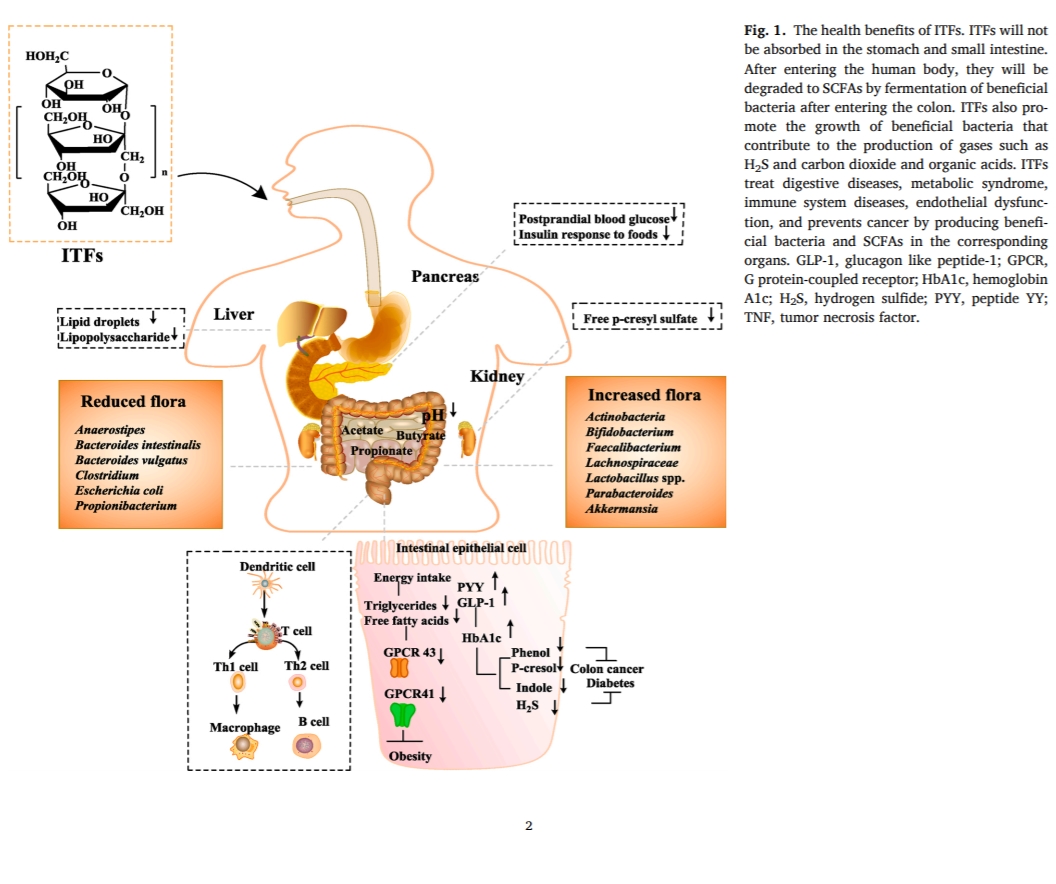 par Nutrimuscle-Conseils » 21 Déc 2020 17:08
par Nutrimuscle-Conseils » 21 Déc 2020 17:08
Overview
According to the above-mentioned clinical trial data, ITFs were
proved effective in the treatment of gastrointestinal diseases such as
constipation (Closa-Monasterolo et al., 2017), celiac disease (Drabinska,
Jarocka-Cyrta, Zlotkowska, Abramowicz, & Krupa-Kozak, 2019),
Crohn’s disease (De Preter et al., 2013), inflammatory bowel disease
(Del Fabbro et al., 2020) and ulcerative colitis (Valcheva et al., 2019).
ITFs regulated metabolic syndromes including fatty liver (Bomhof et al.,
2019), obesity and diabetes (Birkeland et al., 2020), reduced systolic
blood pressure in overweighted people (Hess et al., 2019) and breast
cancer women (Becerril-Alarcon et al., 2019), and regulated the sinusitis
(Lohner et al., 2018), asthma (McLoughlin et al., 2019) and so forth.
In addition, ITFs as an adjuvant were used in influenza vaccines (Gordon
et al., 2016) and increased the immunogenicity of hepatitis B (Gordon,
Kelley, Heinzel, Cooper, & Petrovsky, 2014) (Table 1).
Interestingly, long-chain ITFs (native inulin) promoted weight loss
(Hiel et al., 2020). However, FOS didn’t change body weight or
adiposity (Daud et al., 2014; Hess et al., 2020). Although it’s reported
that ITFs promoted the absorption of minerals (such as iron, magnesium,
etc.) in growing-finishing pigs (Samolinska & Grela, 2017). It didn’t
promote iron absorption in women with low iron status (Petry, Egli,
Chassard, Lacroix, & Hurrell, 2012).
Previous studies indicated that ITFs
restricted the growth of colon cancer in mice (Li, Elmen et al., 2020) and
inhibited the growth of cervical cancer cell line (HeLa), hepatoma cell
lines (HepG2 and 7721) and ovarian cancer cell line (SKOV3) (Xu, Chen
et al., 2016). However, they had no obvious effects on colon cancer,
precancerous condition and rectal cancer patients or breast cancer
women (NCT00335504, NCT02805075), but they reduced systolic
blood pressure and prevented the increases of diastolic blood pressure in
women with breast cancer undergoing neoadjuvant therapy with
cyclophosphamide and doxorubicin (Becerril-Alarcon et al., 2019).
Furthermore, inulin combined with Bifidobacterium lactis B94 showed no
superiority over the standard triple therapy (Islek et al., 2015).
Therefore, many preclinical studies of ITFs need to be reconfirmed in clinical
trials.
Although ITFs displayed many benefits for people’s health, overdose
intake of ITFs would induce gastrointestinal symptoms (Bonnema et al.,
2010) or serious side effects. For example, 16 g/day of oligofructose
improved liver steatosis (Bomhof et al., 2019), while 20 g/day of inulin
aggravated intrahepatocellular lipid in non-alcoholic fatty liver patients
(Chambers et al., 2019). Toll-like receptor 5 deficient mice with ITFs
administration led to hepatic inflammation and eventually caused liver
cancer (Singh et al., 2018). IL-10 receptor induced colitis mice or
dextran sulfate sodium induced colitis mice injected with ITFs weekly
aggravated colitis symptoms (Miles et al., 2017; Singh et al., 2019). As
we known, ITFs as prebiotic were fermented into SCFAs by intestinal
bacteria. Overdose intake of ITFs increased the production of acetate
(Chambers et al., 2019) and butyrate on liver tissues (Singh et al., 2018,
2019), which were used as carbon source. Accumulation of acetate and
butyrate provided extra acetyl coenzyme A, which accelerated liver lipid
accumulation (Chambers et al., 2019) and increased bile acids in the
liver. It led to cholestasis, hepatocyte damage, drived inflammation and
compensatory cell proliferation, and eventually resulted in liver cancer
(Chambers et al., 2019; Singh et al., 2018).
ITFs improved the immune system by regulating the changes of
bacteria and fermentation metabolites (Honda-Okubo et al., 2015).
However, ITFs overload caused acute laminitis (Li et al., 2017), acute
ruminal acidosis (Concha et al., 2014) and acute bovine laminitis
(Thoefner et al., 2004). Excessive ITFs produced more SCFAs and led to a
decrease in rumen pH values (Concha et al., 2014). A lower pH increased
Gram-positive bacteria and lactic acids, leading to rumen acidosis
(Alarcon et al., 2019). This environment altered the rumen microflora
(increasing the abundance of Streptococcus, Lactobacillus and decreasing
the proportion of Ruminobacteriaceae, Butyrivibrio, Lachnospiraceae
and Ruminococcus) and led to acute lamellar inflammation and laminitis
(Thoefner et al., 2004). In addition, superfluous ITFs stimulated immune
cells to produce inflammatory cytokines IL-1α, IL-1β, IL-6 and IL-10 (Li,
Ding et al., 2020). Acute rumen acidosis increased D-lactic acid, which
reduced reactive oxygen species and L-selectin in bovine neutrophils
induced by platelet activating factor (Concha et al., 2014).
Additionally, ITFs with LDP were fermented rapidly in the proximal
colon, while ITFs with HDP were not fermented until they reached the
distal colon (Vogt et al., 2015)). Thereby, ITFs with HDP were generally
more resistant to intestinal fermentation. ITFs with LDP were more
likely to contact with microbiota, and subsequently produced various
SCFAs (Fu et al., 2019). Consequently, the tolerable dose of ITFs with
HDP were higher than that of LDP, which was attributed to the slower
and more stable fermentation of ITFs with HDP (Bonnema et al., 2010).
However, there are a few reports on how DP values influrnce the effects
of ITFs, which is worthy of further systematic studies.
In conclusion, inulin-type fructans as prebiotic are fermented into
SCFAs by intestinal bacteria. They improve digestive system, metabolic
syndrome, immune system and inflammatory diseases, and prevent
against infection and cancer. However, many preclinical studies of ITFs
need to be reconfirmed in clinical trials. Furthermore, overdose intake of
ITFs aggravate the development of non-alcoholic fatty liver disease and
lead to gastrointestinal symptoms, liver canceras well as intestinal
inflammation. Several reports indicate that the tolerable dose of longchain ITFs are higher than that of low-chain ones, which could be
attributed to the slower and more stable fermentation of long-chain
ITFs. All in all, more experimental work is urgently needed for further
safety evaluation and rational applications of ITFs in the future.














